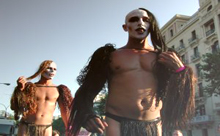

What Causes Homosexuality?

Regent University’s Law Review for spring, 2002, is entirely devoted to a discussion of various aspects of homosexuality, including the origins and causes of homosexual behaviors. The Law Review includes a study, "Homosexuality: Innate and Immutable?” by Dr. A. Dean Byrd and Stony Olsen.
After discussing the lack of evidence on the genetic origins of homosexuality, Dr. Byrd and his associate detail the various environmental factors that can lead a person into a homosexual lifestyle.
Gender Confusion:
Dr. George Rekers, an expert on Gender Identity Disorders, is author of dozens of scholarly research papers on homosexuality and wrote Growing Up Straight: What Every Family Should Know About Homosexuality in 1982. He is also editor of Handbook of Child and Adolescent Sexual Problems, published in 1995. Dr. Rekers stated in 1995, that "Gender nonconformity in childhood may be the single common observable factor associated with homosexuality. Some of the typical childhood factors leading to homosexuality are: feeling of being different from other children; perception of father as being distant, uninvolved and unapproving; perception of mother being too close, too involved; diminished or distorted masculinity or femininity; premature introduction to sexuality; and gender confusion.
Failure to Internalize Maleness:
Dr. Joseph Nicolosi, president of the National Association for Research and Therapy of Homosexuality has written: "Homosexuality is a developmental problem that is almost always the result of problems in family relationships, particularly between father and son. As a result of failure with father, the boy does not fully internalize male gender identity, and develops homosexuality. This is the most commonly seen clinical model."
Dr. George Rekers, writing in Growing Up Straight, observes: "Many studies of homosexual patients as well as of nonpatient homosexuals have established a classic pattern of background family relations. The most frequent family pattern reported from the male homosexuals includes a binding, intimate mother in combination with a hostile, detached father."
Sexual Abuse by Same-Sex Predator:
In studies conducted by Diana Shrier and Robert Johnson in 1985 and 1988, males who had been sexually abused as children were almost seven times as likely as non-molested boys to become homosexuals.
Dr. Gregory Dickson recently completed a doctoral dissertation on the pattern of relationships between mothers and their male homosexual sons. His paper is entitled: "An Empirical Study of the Mother/Son Dyad in Relation to the Development of Adult Male Homosexuality: An Object Relations Perspective."
Dr. Dickson's study is reviewed on the NARTH web site. His study sheds new light on the relationship between early childhood sexual abuse and a child's later involvement in homosexual behaviors. According to Dickson, an alarming 49% of homosexuals surveyed had been molested compared to less than 2% of heterosexuals.
His study affirms previous findings of Dr. David Finkelhor (1984), which found that boys victimized by older men were four times more likely to be currently involved in homosexual behaviors than were non-victims. As Finkelhor observed: "It may be common for a boy who has been involved in an experience with an older man to label himself as homosexual (1) because he has had a homosexual experience and (2) because he was found to be sexually attractive by a man. Once he labels himself homosexual, the boy may begin to behave consistently with the role and gravitate toward homosexual activity." (Child Sexual Abuse: New Theory and Research, New York: The Free Press, 1984).
Dr. Dickson's study suggests that sexual abuse should be considered in evaluating the factors that contribute to the development of adult homosexual behaviors. Dickson writes: "An experience of sexual abuse could possibly contribute to the sexualizing of the unmet needs for male affection, attention, and connection."
Dr. Dickson continues: "Given the relational deficits [with his mother] experienced by the male child, it is also possible that the molestation, as devastating as it may have been emotionally, simultaneously may be experienced by some of the boys as their first form of adult male affection, as well as something relational that is not shared in common with his mother."
Counselor Dr. Robert Hicks, author of The Masculine Journey, has written: "…In counseling gay men for twenty years, I have not had one yet whom I would say had a normative childhood or normative adolescent development in the sexual arena. More often than not I have found stories of abusive, alcoholic, or absent (physically and emotionally) fathers: stories of incest or first experiences of sex forced upon them by older brothers, neighborhood men, or even friends. I sometimes find these men have had early exposure to pornography…."
Final Thought
In summary, the most credible research to date on homosexuality-and research conducted years ago-demonstrates that no one is "born gay." The homosexual is suffering from a developmental problem, which frequently starts out in childhood as gender confusion, family dysfunction, or molestation.
From a Christian perspective, homosexual behavior is also labeled a sin and a sexual perversion. It is a behavior that must be repented of. The sin is akin to allowing oneself to become addicted to pornography or to drugs. These behaviors can be overcome-but the person must want to change!
 Print
Print